Health Science Research: Ethics in Human Drug Trials Literature Review
VerifiedAdded on 2021/06/17
|15
|3494
|25
Report
AI Summary
This report presents a literature review focused on the ethics of human drug trials, specifically within the realm of pharmacological research. The review analyzes two key research papers. The first paper examines the influence of study types on the queries raised by research ethics committees (RECs) in medical studies, highlighting the REC's role in ensuring ethical and scientific validity. The second paper delves into the ethical and health implications of outsourcing clinical trials to Latin America, addressing the safety, accessibility, and commercialization aspects of new pharmaceutical products. The report provides a detailed overview of the methodologies, findings, and limitations of each study, offering insights into the complexities of ethical considerations within the context of clinical trials and drug development.
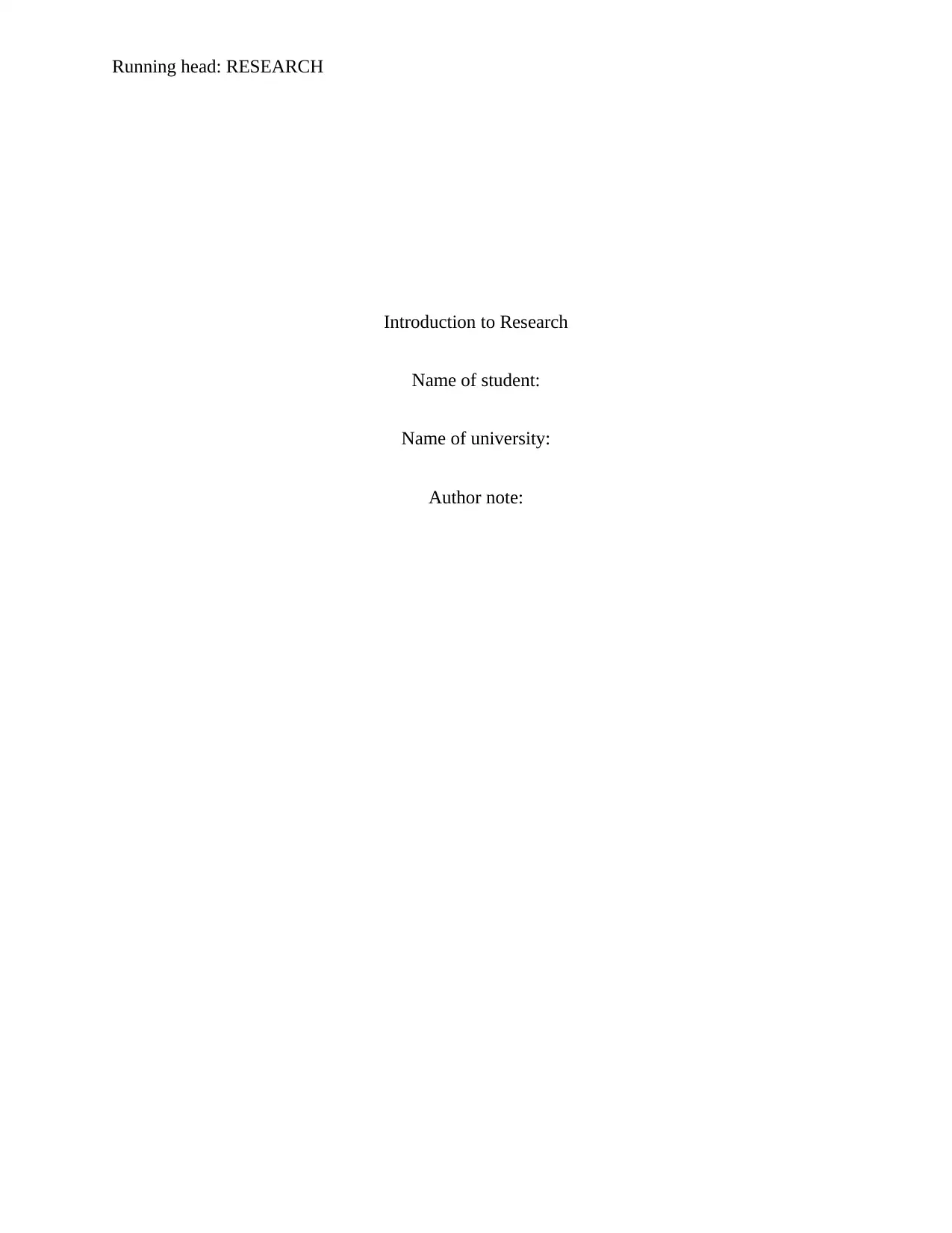
Running head: RESEARCH
Introduction to Research
Name of student:
Name of university:
Author note:
Introduction to Research
Name of student:
Name of university:
Author note:
Paraphrase This Document
Need a fresh take? Get an instant paraphrase of this document with our AI Paraphraser
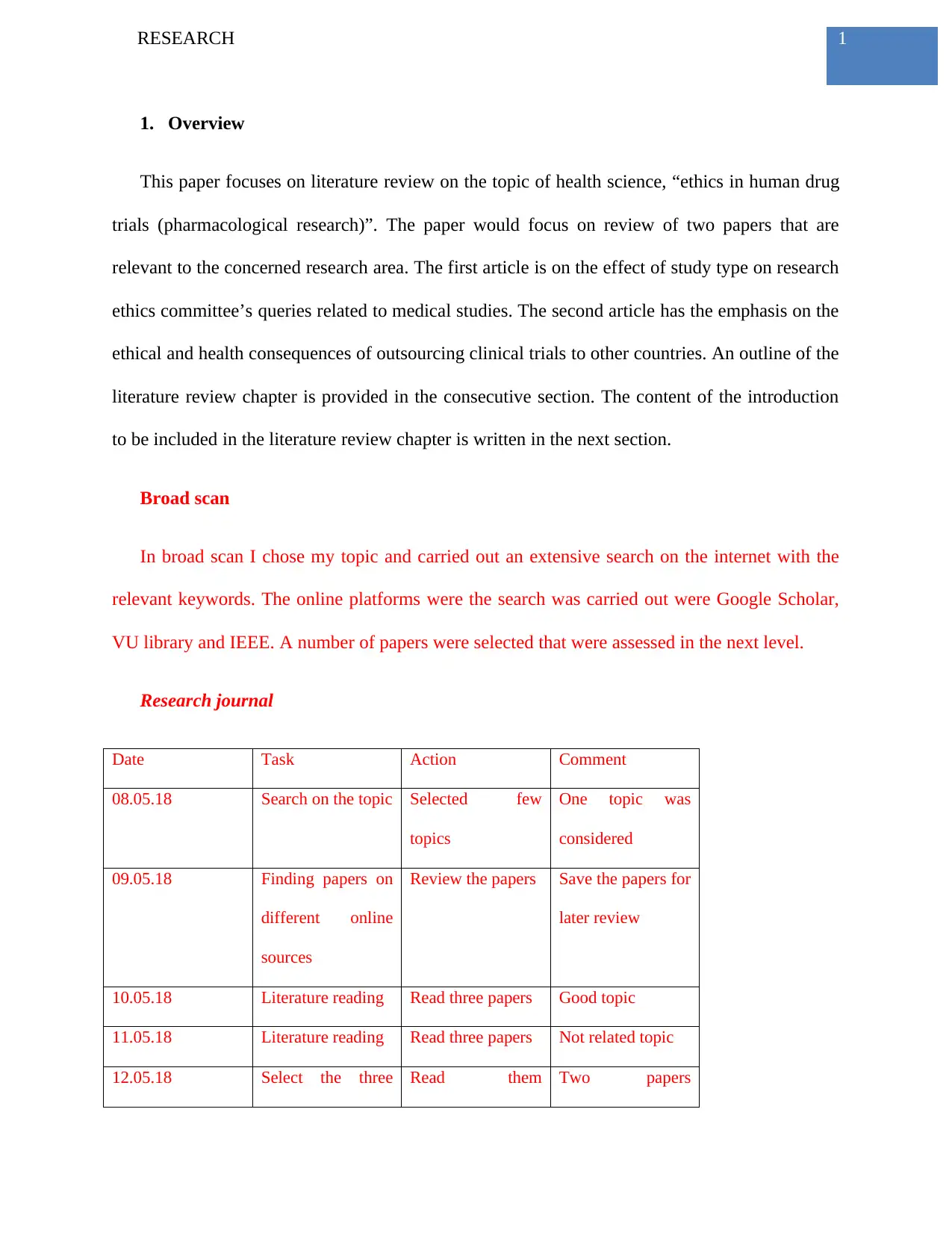
1RESEARCH
1. Overview
This paper focuses on literature review on the topic of health science, “ethics in human drug
trials (pharmacological research)”. The paper would focus on review of two papers that are
relevant to the concerned research area. The first article is on the effect of study type on research
ethics committee’s queries related to medical studies. The second article has the emphasis on the
ethical and health consequences of outsourcing clinical trials to other countries. An outline of the
literature review chapter is provided in the consecutive section. The content of the introduction
to be included in the literature review chapter is written in the next section.
Broad scan
In broad scan I chose my topic and carried out an extensive search on the internet with the
relevant keywords. The online platforms were the search was carried out were Google Scholar,
VU library and IEEE. A number of papers were selected that were assessed in the next level.
Research journal
Date Task Action Comment
08.05.18 Search on the topic Selected few
topics
One topic was
considered
09.05.18 Finding papers on
different online
sources
Review the papers Save the papers for
later review
10.05.18 Literature reading Read three papers Good topic
11.05.18 Literature reading Read three papers Not related topic
12.05.18 Select the three Read them Two papers
1. Overview
This paper focuses on literature review on the topic of health science, “ethics in human drug
trials (pharmacological research)”. The paper would focus on review of two papers that are
relevant to the concerned research area. The first article is on the effect of study type on research
ethics committee’s queries related to medical studies. The second article has the emphasis on the
ethical and health consequences of outsourcing clinical trials to other countries. An outline of the
literature review chapter is provided in the consecutive section. The content of the introduction
to be included in the literature review chapter is written in the next section.
Broad scan
In broad scan I chose my topic and carried out an extensive search on the internet with the
relevant keywords. The online platforms were the search was carried out were Google Scholar,
VU library and IEEE. A number of papers were selected that were assessed in the next level.
Research journal
Date Task Action Comment
08.05.18 Search on the topic Selected few
topics
One topic was
considered
09.05.18 Finding papers on
different online
sources
Review the papers Save the papers for
later review
10.05.18 Literature reading Read three papers Good topic
11.05.18 Literature reading Read three papers Not related topic
12.05.18 Select the three Read them Two papers
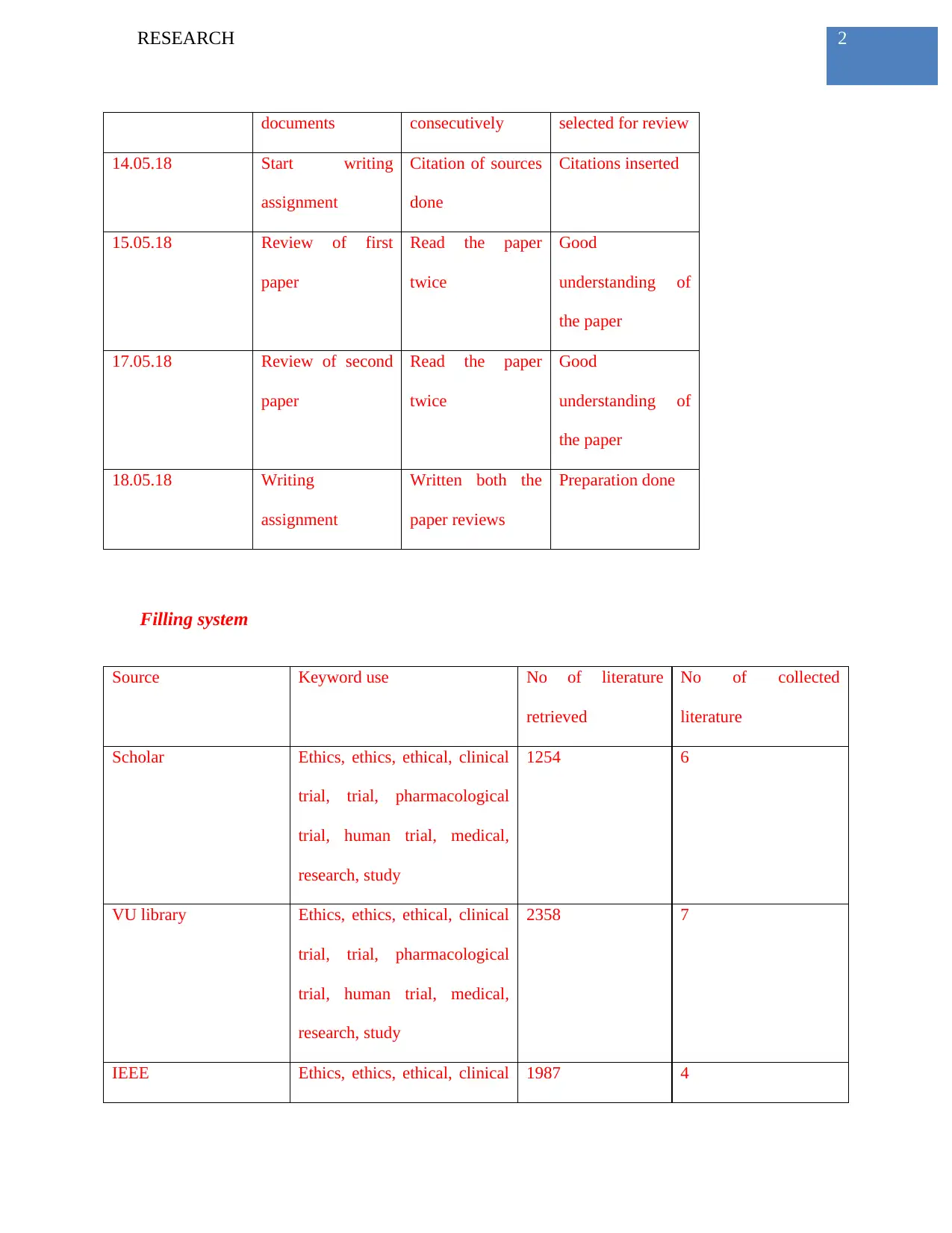
2RESEARCH
documents consecutively selected for review
14.05.18 Start writing
assignment
Citation of sources
done
Citations inserted
15.05.18 Review of first
paper
Read the paper
twice
Good
understanding of
the paper
17.05.18 Review of second
paper
Read the paper
twice
Good
understanding of
the paper
18.05.18 Writing
assignment
Written both the
paper reviews
Preparation done
Filling system
Source Keyword use No of literature
retrieved
No of collected
literature
Scholar Ethics, ethics, ethical, clinical
trial, trial, pharmacological
trial, human trial, medical,
research, study
1254 6
VU library Ethics, ethics, ethical, clinical
trial, trial, pharmacological
trial, human trial, medical,
research, study
2358 7
IEEE Ethics, ethics, ethical, clinical 1987 4
documents consecutively selected for review
14.05.18 Start writing
assignment
Citation of sources
done
Citations inserted
15.05.18 Review of first
paper
Read the paper
twice
Good
understanding of
the paper
17.05.18 Review of second
paper
Read the paper
twice
Good
understanding of
the paper
18.05.18 Writing
assignment
Written both the
paper reviews
Preparation done
Filling system
Source Keyword use No of literature
retrieved
No of collected
literature
Scholar Ethics, ethics, ethical, clinical
trial, trial, pharmacological
trial, human trial, medical,
research, study
1254 6
VU library Ethics, ethics, ethical, clinical
trial, trial, pharmacological
trial, human trial, medical,
research, study
2358 7
IEEE Ethics, ethics, ethical, clinical 1987 4
⊘ This is a preview!⊘
Do you want full access?
Subscribe today to unlock all pages.

Trusted by 1+ million students worldwide
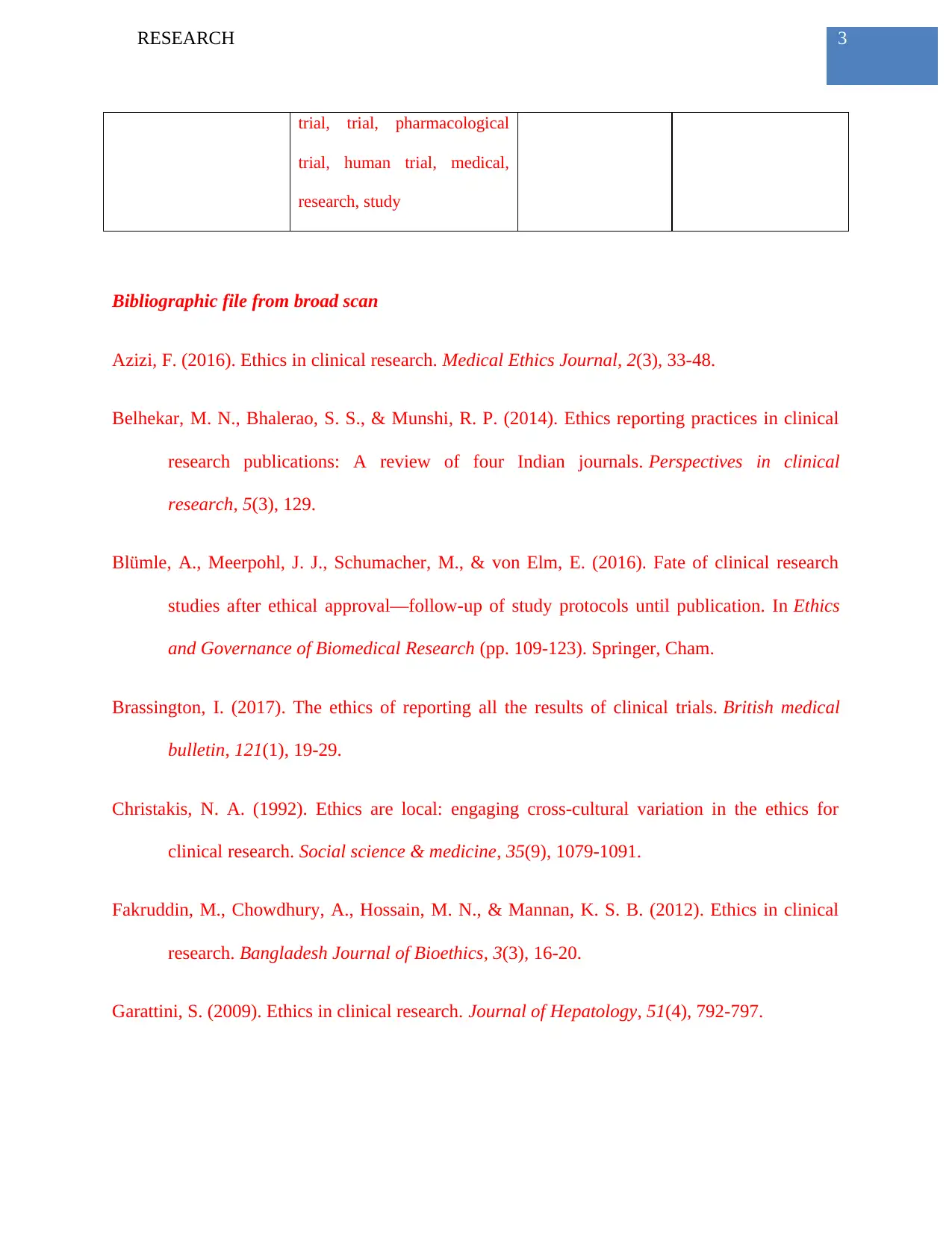
3RESEARCH
trial, trial, pharmacological
trial, human trial, medical,
research, study
Bibliographic file from broad scan
Azizi, F. (2016). Ethics in clinical research. Medical Ethics Journal, 2(3), 33-48.
Belhekar, M. N., Bhalerao, S. S., & Munshi, R. P. (2014). Ethics reporting practices in clinical
research publications: A review of four Indian journals. Perspectives in clinical
research, 5(3), 129.
Blümle, A., Meerpohl, J. J., Schumacher, M., & von Elm, E. (2016). Fate of clinical research
studies after ethical approval—follow-up of study protocols until publication. In Ethics
and Governance of Biomedical Research (pp. 109-123). Springer, Cham.
Brassington, I. (2017). The ethics of reporting all the results of clinical trials. British medical
bulletin, 121(1), 19-29.
Christakis, N. A. (1992). Ethics are local: engaging cross-cultural variation in the ethics for
clinical research. Social science & medicine, 35(9), 1079-1091.
Fakruddin, M., Chowdhury, A., Hossain, M. N., & Mannan, K. S. B. (2012). Ethics in clinical
research. Bangladesh Journal of Bioethics, 3(3), 16-20.
Garattini, S. (2009). Ethics in clinical research. Journal of Hepatology, 51(4), 792-797.
trial, trial, pharmacological
trial, human trial, medical,
research, study
Bibliographic file from broad scan
Azizi, F. (2016). Ethics in clinical research. Medical Ethics Journal, 2(3), 33-48.
Belhekar, M. N., Bhalerao, S. S., & Munshi, R. P. (2014). Ethics reporting practices in clinical
research publications: A review of four Indian journals. Perspectives in clinical
research, 5(3), 129.
Blümle, A., Meerpohl, J. J., Schumacher, M., & von Elm, E. (2016). Fate of clinical research
studies after ethical approval—follow-up of study protocols until publication. In Ethics
and Governance of Biomedical Research (pp. 109-123). Springer, Cham.
Brassington, I. (2017). The ethics of reporting all the results of clinical trials. British medical
bulletin, 121(1), 19-29.
Christakis, N. A. (1992). Ethics are local: engaging cross-cultural variation in the ethics for
clinical research. Social science & medicine, 35(9), 1079-1091.
Fakruddin, M., Chowdhury, A., Hossain, M. N., & Mannan, K. S. B. (2012). Ethics in clinical
research. Bangladesh Journal of Bioethics, 3(3), 16-20.
Garattini, S. (2009). Ethics in clinical research. Journal of Hepatology, 51(4), 792-797.
Paraphrase This Document
Need a fresh take? Get an instant paraphrase of this document with our AI Paraphraser
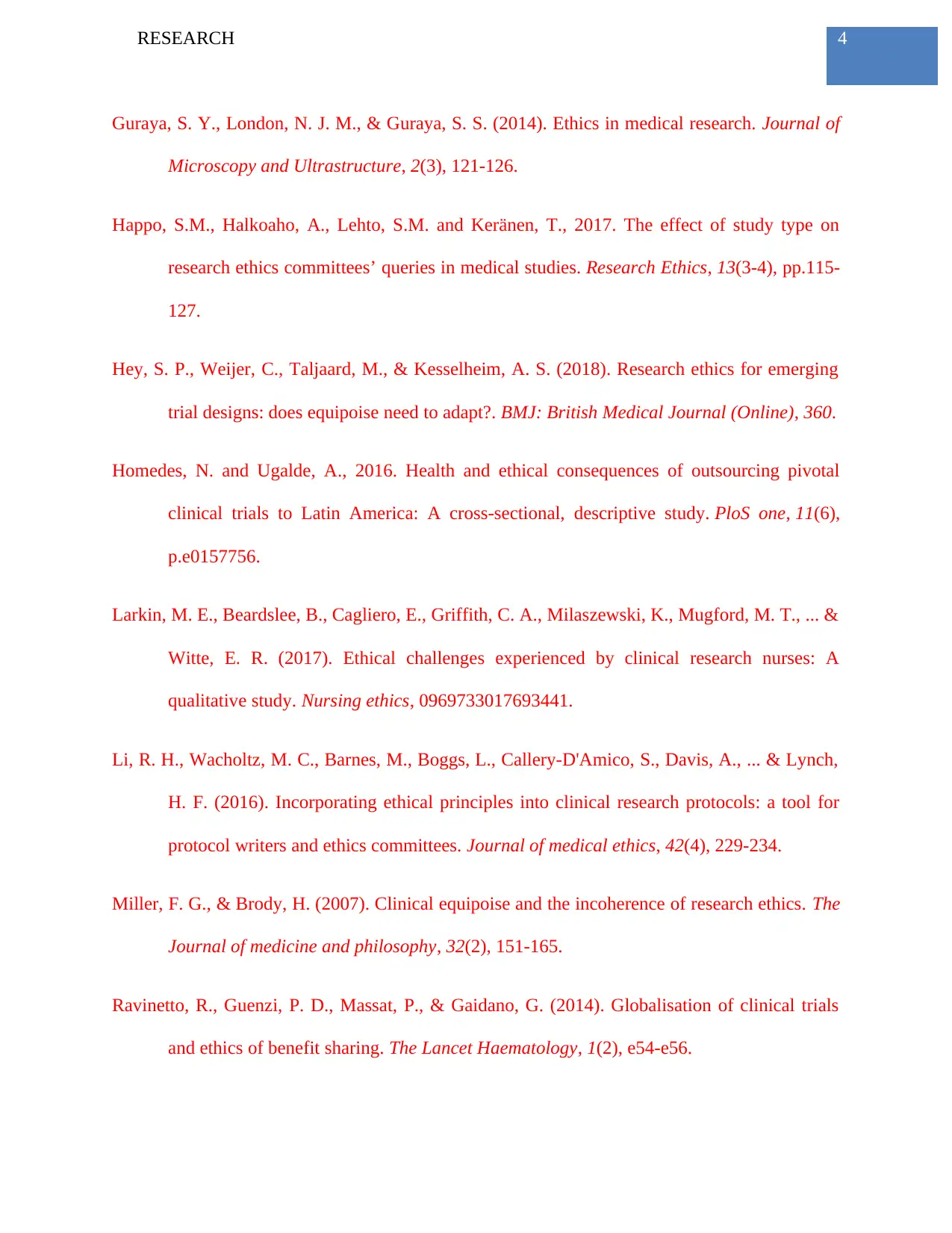
4RESEARCH
Guraya, S. Y., London, N. J. M., & Guraya, S. S. (2014). Ethics in medical research. Journal of
Microscopy and Ultrastructure, 2(3), 121-126.
Happo, S.M., Halkoaho, A., Lehto, S.M. and Keränen, T., 2017. The effect of study type on
research ethics committees’ queries in medical studies. Research Ethics, 13(3-4), pp.115-
127.
Hey, S. P., Weijer, C., Taljaard, M., & Kesselheim, A. S. (2018). Research ethics for emerging
trial designs: does equipoise need to adapt?. BMJ: British Medical Journal (Online), 360.
Homedes, N. and Ugalde, A., 2016. Health and ethical consequences of outsourcing pivotal
clinical trials to Latin America: A cross-sectional, descriptive study. PloS one, 11(6),
p.e0157756.
Larkin, M. E., Beardslee, B., Cagliero, E., Griffith, C. A., Milaszewski, K., Mugford, M. T., ... &
Witte, E. R. (2017). Ethical challenges experienced by clinical research nurses: A
qualitative study. Nursing ethics, 0969733017693441.
Li, R. H., Wacholtz, M. C., Barnes, M., Boggs, L., Callery-D'Amico, S., Davis, A., ... & Lynch,
H. F. (2016). Incorporating ethical principles into clinical research protocols: a tool for
protocol writers and ethics committees. Journal of medical ethics, 42(4), 229-234.
Miller, F. G., & Brody, H. (2007). Clinical equipoise and the incoherence of research ethics. The
Journal of medicine and philosophy, 32(2), 151-165.
Ravinetto, R., Guenzi, P. D., Massat, P., & Gaidano, G. (2014). Globalisation of clinical trials
and ethics of benefit sharing. The Lancet Haematology, 1(2), e54-e56.
Guraya, S. Y., London, N. J. M., & Guraya, S. S. (2014). Ethics in medical research. Journal of
Microscopy and Ultrastructure, 2(3), 121-126.
Happo, S.M., Halkoaho, A., Lehto, S.M. and Keränen, T., 2017. The effect of study type on
research ethics committees’ queries in medical studies. Research Ethics, 13(3-4), pp.115-
127.
Hey, S. P., Weijer, C., Taljaard, M., & Kesselheim, A. S. (2018). Research ethics for emerging
trial designs: does equipoise need to adapt?. BMJ: British Medical Journal (Online), 360.
Homedes, N. and Ugalde, A., 2016. Health and ethical consequences of outsourcing pivotal
clinical trials to Latin America: A cross-sectional, descriptive study. PloS one, 11(6),
p.e0157756.
Larkin, M. E., Beardslee, B., Cagliero, E., Griffith, C. A., Milaszewski, K., Mugford, M. T., ... &
Witte, E. R. (2017). Ethical challenges experienced by clinical research nurses: A
qualitative study. Nursing ethics, 0969733017693441.
Li, R. H., Wacholtz, M. C., Barnes, M., Boggs, L., Callery-D'Amico, S., Davis, A., ... & Lynch,
H. F. (2016). Incorporating ethical principles into clinical research protocols: a tool for
protocol writers and ethics committees. Journal of medical ethics, 42(4), 229-234.
Miller, F. G., & Brody, H. (2007). Clinical equipoise and the incoherence of research ethics. The
Journal of medicine and philosophy, 32(2), 151-165.
Ravinetto, R., Guenzi, P. D., Massat, P., & Gaidano, G. (2014). Globalisation of clinical trials
and ethics of benefit sharing. The Lancet Haematology, 1(2), e54-e56.
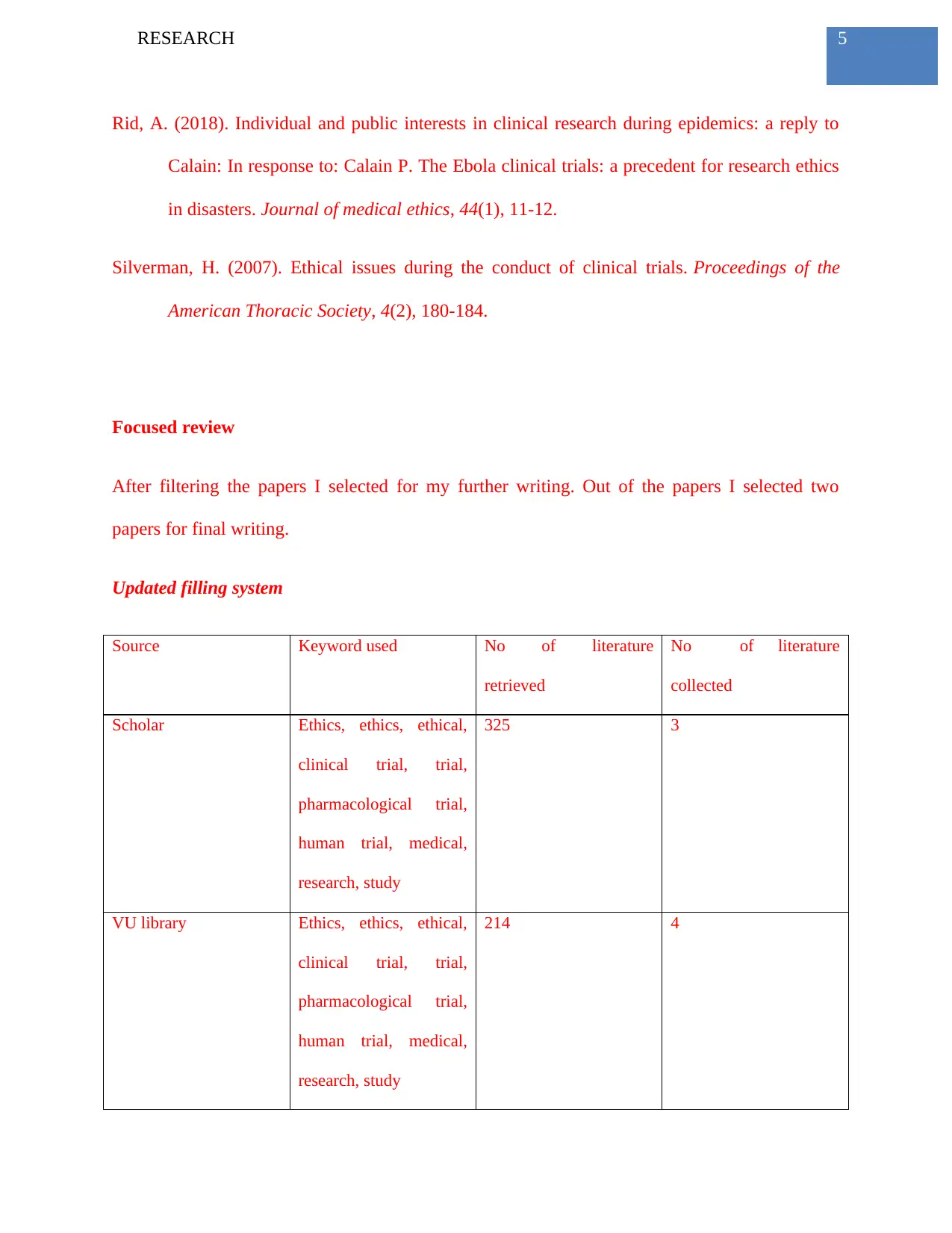
5RESEARCH
Rid, A. (2018). Individual and public interests in clinical research during epidemics: a reply to
Calain: In response to: Calain P. The Ebola clinical trials: a precedent for research ethics
in disasters. Journal of medical ethics, 44(1), 11-12.
Silverman, H. (2007). Ethical issues during the conduct of clinical trials. Proceedings of the
American Thoracic Society, 4(2), 180-184.
Focused review
After filtering the papers I selected for my further writing. Out of the papers I selected two
papers for final writing.
Updated filling system
Source Keyword used No of literature
retrieved
No of literature
collected
Scholar Ethics, ethics, ethical,
clinical trial, trial,
pharmacological trial,
human trial, medical,
research, study
325 3
VU library Ethics, ethics, ethical,
clinical trial, trial,
pharmacological trial,
human trial, medical,
research, study
214 4
Rid, A. (2018). Individual and public interests in clinical research during epidemics: a reply to
Calain: In response to: Calain P. The Ebola clinical trials: a precedent for research ethics
in disasters. Journal of medical ethics, 44(1), 11-12.
Silverman, H. (2007). Ethical issues during the conduct of clinical trials. Proceedings of the
American Thoracic Society, 4(2), 180-184.
Focused review
After filtering the papers I selected for my further writing. Out of the papers I selected two
papers for final writing.
Updated filling system
Source Keyword used No of literature
retrieved
No of literature
collected
Scholar Ethics, ethics, ethical,
clinical trial, trial,
pharmacological trial,
human trial, medical,
research, study
325 3
VU library Ethics, ethics, ethical,
clinical trial, trial,
pharmacological trial,
human trial, medical,
research, study
214 4
⊘ This is a preview!⊘
Do you want full access?
Subscribe today to unlock all pages.

Trusted by 1+ million students worldwide
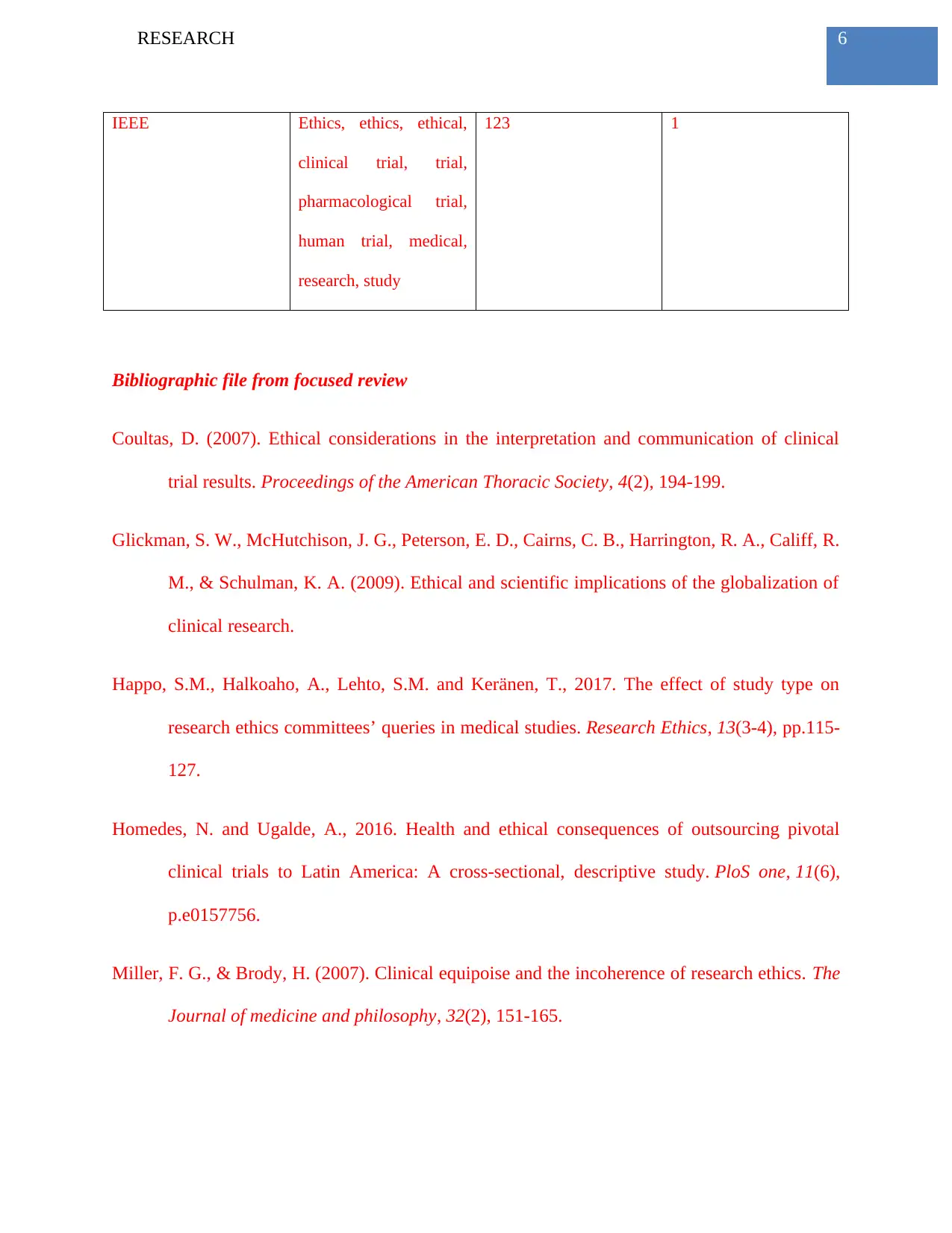
6RESEARCH
IEEE Ethics, ethics, ethical,
clinical trial, trial,
pharmacological trial,
human trial, medical,
research, study
123 1
Bibliographic file from focused review
Coultas, D. (2007). Ethical considerations in the interpretation and communication of clinical
trial results. Proceedings of the American Thoracic Society, 4(2), 194-199.
Glickman, S. W., McHutchison, J. G., Peterson, E. D., Cairns, C. B., Harrington, R. A., Califf, R.
M., & Schulman, K. A. (2009). Ethical and scientific implications of the globalization of
clinical research.
Happo, S.M., Halkoaho, A., Lehto, S.M. and Keränen, T., 2017. The effect of study type on
research ethics committees’ queries in medical studies. Research Ethics, 13(3-4), pp.115-
127.
Homedes, N. and Ugalde, A., 2016. Health and ethical consequences of outsourcing pivotal
clinical trials to Latin America: A cross-sectional, descriptive study. PloS one, 11(6),
p.e0157756.
Miller, F. G., & Brody, H. (2007). Clinical equipoise and the incoherence of research ethics. The
Journal of medicine and philosophy, 32(2), 151-165.
IEEE Ethics, ethics, ethical,
clinical trial, trial,
pharmacological trial,
human trial, medical,
research, study
123 1
Bibliographic file from focused review
Coultas, D. (2007). Ethical considerations in the interpretation and communication of clinical
trial results. Proceedings of the American Thoracic Society, 4(2), 194-199.
Glickman, S. W., McHutchison, J. G., Peterson, E. D., Cairns, C. B., Harrington, R. A., Califf, R.
M., & Schulman, K. A. (2009). Ethical and scientific implications of the globalization of
clinical research.
Happo, S.M., Halkoaho, A., Lehto, S.M. and Keränen, T., 2017. The effect of study type on
research ethics committees’ queries in medical studies. Research Ethics, 13(3-4), pp.115-
127.
Homedes, N. and Ugalde, A., 2016. Health and ethical consequences of outsourcing pivotal
clinical trials to Latin America: A cross-sectional, descriptive study. PloS one, 11(6),
p.e0157756.
Miller, F. G., & Brody, H. (2007). Clinical equipoise and the incoherence of research ethics. The
Journal of medicine and philosophy, 32(2), 151-165.
Paraphrase This Document
Need a fresh take? Get an instant paraphrase of this document with our AI Paraphraser
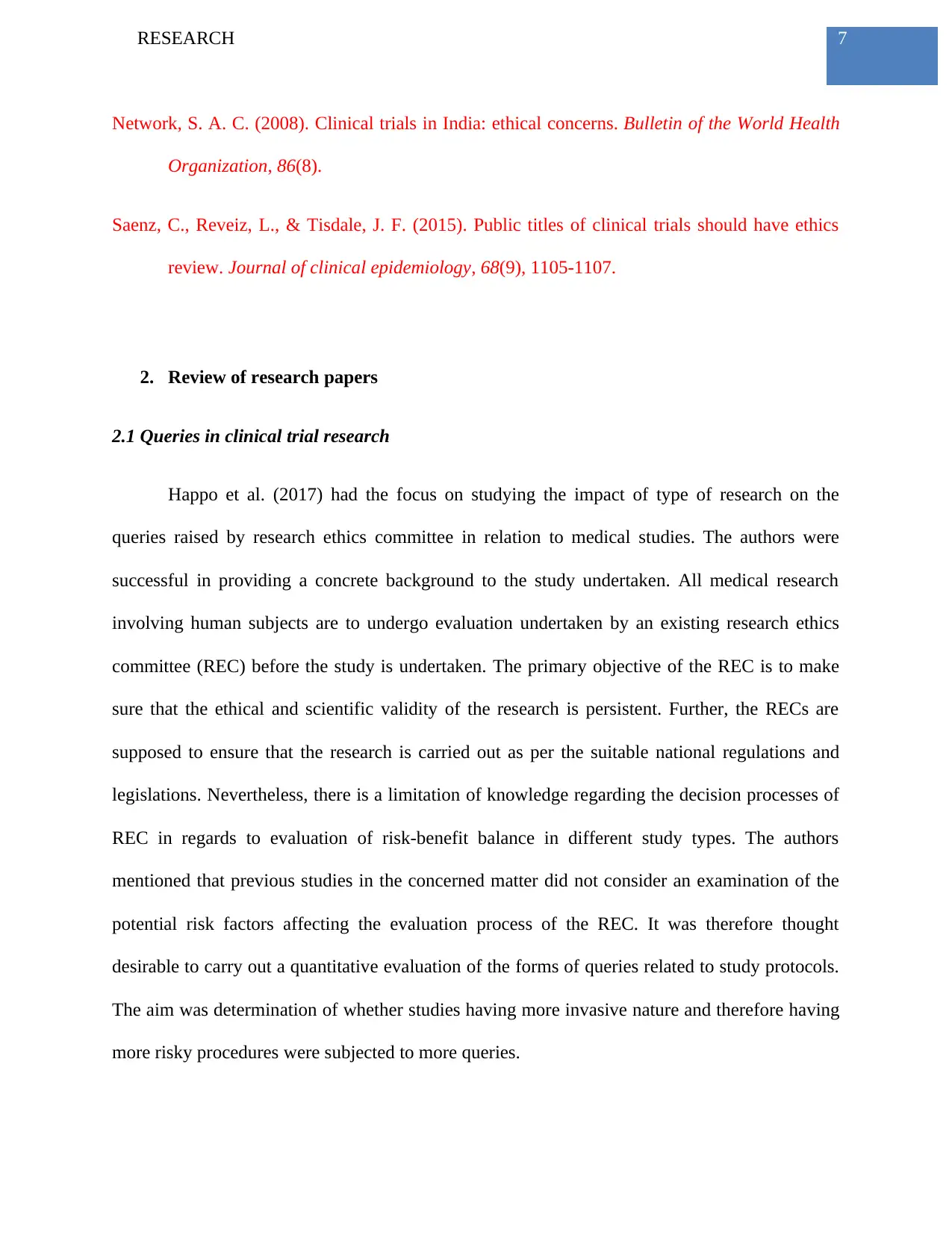
7RESEARCH
Network, S. A. C. (2008). Clinical trials in India: ethical concerns. Bulletin of the World Health
Organization, 86(8).
Saenz, C., Reveiz, L., & Tisdale, J. F. (2015). Public titles of clinical trials should have ethics
review. Journal of clinical epidemiology, 68(9), 1105-1107.
2. Review of research papers
2.1 Queries in clinical trial research
Happo et al. (2017) had the focus on studying the impact of type of research on the
queries raised by research ethics committee in relation to medical studies. The authors were
successful in providing a concrete background to the study undertaken. All medical research
involving human subjects are to undergo evaluation undertaken by an existing research ethics
committee (REC) before the study is undertaken. The primary objective of the REC is to make
sure that the ethical and scientific validity of the research is persistent. Further, the RECs are
supposed to ensure that the research is carried out as per the suitable national regulations and
legislations. Nevertheless, there is a limitation of knowledge regarding the decision processes of
REC in regards to evaluation of risk-benefit balance in different study types. The authors
mentioned that previous studies in the concerned matter did not consider an examination of the
potential risk factors affecting the evaluation process of the REC. It was therefore thought
desirable to carry out a quantitative evaluation of the forms of queries related to study protocols.
The aim was determination of whether studies having more invasive nature and therefore having
more risky procedures were subjected to more queries.
Network, S. A. C. (2008). Clinical trials in India: ethical concerns. Bulletin of the World Health
Organization, 86(8).
Saenz, C., Reveiz, L., & Tisdale, J. F. (2015). Public titles of clinical trials should have ethics
review. Journal of clinical epidemiology, 68(9), 1105-1107.
2. Review of research papers
2.1 Queries in clinical trial research
Happo et al. (2017) had the focus on studying the impact of type of research on the
queries raised by research ethics committee in relation to medical studies. The authors were
successful in providing a concrete background to the study undertaken. All medical research
involving human subjects are to undergo evaluation undertaken by an existing research ethics
committee (REC) before the study is undertaken. The primary objective of the REC is to make
sure that the ethical and scientific validity of the research is persistent. Further, the RECs are
supposed to ensure that the research is carried out as per the suitable national regulations and
legislations. Nevertheless, there is a limitation of knowledge regarding the decision processes of
REC in regards to evaluation of risk-benefit balance in different study types. The authors
mentioned that previous studies in the concerned matter did not consider an examination of the
potential risk factors affecting the evaluation process of the REC. It was therefore thought
desirable to carry out a quantitative evaluation of the forms of queries related to study protocols.
The aim was determination of whether studies having more invasive nature and therefore having
more risky procedures were subjected to more queries.
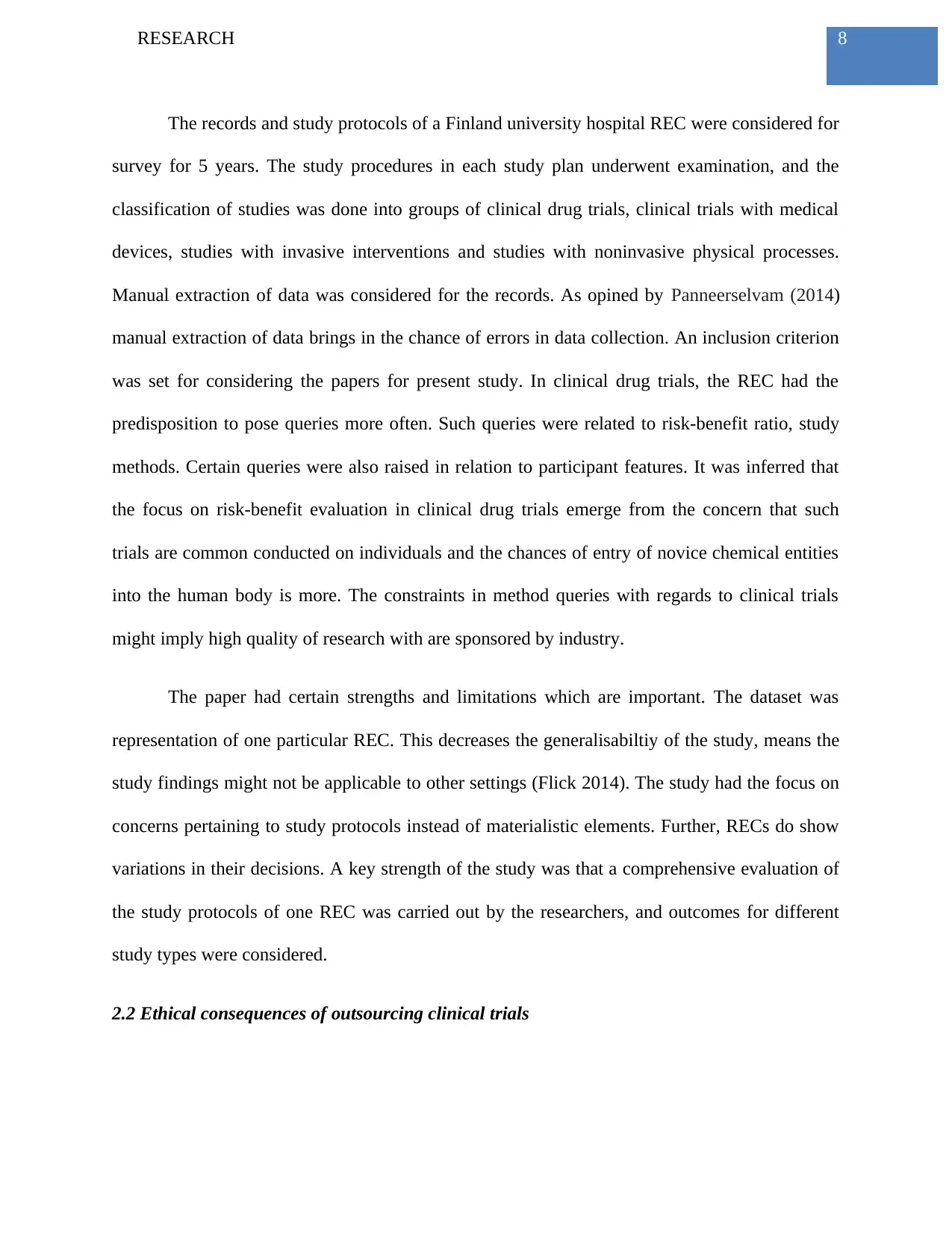
8RESEARCH
The records and study protocols of a Finland university hospital REC were considered for
survey for 5 years. The study procedures in each study plan underwent examination, and the
classification of studies was done into groups of clinical drug trials, clinical trials with medical
devices, studies with invasive interventions and studies with noninvasive physical processes.
Manual extraction of data was considered for the records. As opined by Panneerselvam (2014)
manual extraction of data brings in the chance of errors in data collection. An inclusion criterion
was set for considering the papers for present study. In clinical drug trials, the REC had the
predisposition to pose queries more often. Such queries were related to risk-benefit ratio, study
methods. Certain queries were also raised in relation to participant features. It was inferred that
the focus on risk-benefit evaluation in clinical drug trials emerge from the concern that such
trials are common conducted on individuals and the chances of entry of novice chemical entities
into the human body is more. The constraints in method queries with regards to clinical trials
might imply high quality of research with are sponsored by industry.
The paper had certain strengths and limitations which are important. The dataset was
representation of one particular REC. This decreases the generalisabiltiy of the study, means the
study findings might not be applicable to other settings (Flick 2014). The study had the focus on
concerns pertaining to study protocols instead of materialistic elements. Further, RECs do show
variations in their decisions. A key strength of the study was that a comprehensive evaluation of
the study protocols of one REC was carried out by the researchers, and outcomes for different
study types were considered.
2.2 Ethical consequences of outsourcing clinical trials
The records and study protocols of a Finland university hospital REC were considered for
survey for 5 years. The study procedures in each study plan underwent examination, and the
classification of studies was done into groups of clinical drug trials, clinical trials with medical
devices, studies with invasive interventions and studies with noninvasive physical processes.
Manual extraction of data was considered for the records. As opined by Panneerselvam (2014)
manual extraction of data brings in the chance of errors in data collection. An inclusion criterion
was set for considering the papers for present study. In clinical drug trials, the REC had the
predisposition to pose queries more often. Such queries were related to risk-benefit ratio, study
methods. Certain queries were also raised in relation to participant features. It was inferred that
the focus on risk-benefit evaluation in clinical drug trials emerge from the concern that such
trials are common conducted on individuals and the chances of entry of novice chemical entities
into the human body is more. The constraints in method queries with regards to clinical trials
might imply high quality of research with are sponsored by industry.
The paper had certain strengths and limitations which are important. The dataset was
representation of one particular REC. This decreases the generalisabiltiy of the study, means the
study findings might not be applicable to other settings (Flick 2014). The study had the focus on
concerns pertaining to study protocols instead of materialistic elements. Further, RECs do show
variations in their decisions. A key strength of the study was that a comprehensive evaluation of
the study protocols of one REC was carried out by the researchers, and outcomes for different
study types were considered.
2.2 Ethical consequences of outsourcing clinical trials
⊘ This is a preview!⊘
Do you want full access?
Subscribe today to unlock all pages.

Trusted by 1+ million students worldwide
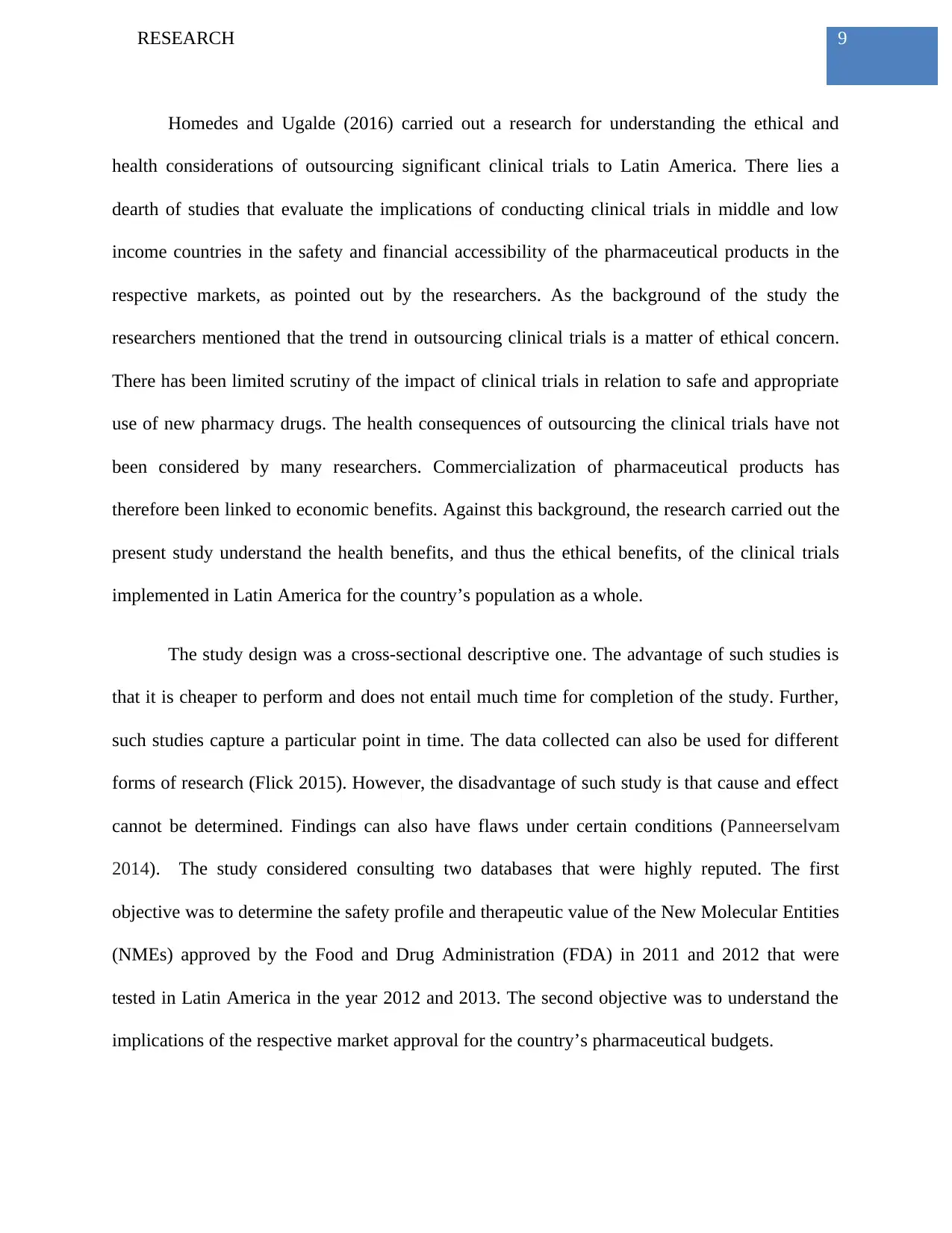
9RESEARCH
Homedes and Ugalde (2016) carried out a research for understanding the ethical and
health considerations of outsourcing significant clinical trials to Latin America. There lies a
dearth of studies that evaluate the implications of conducting clinical trials in middle and low
income countries in the safety and financial accessibility of the pharmaceutical products in the
respective markets, as pointed out by the researchers. As the background of the study the
researchers mentioned that the trend in outsourcing clinical trials is a matter of ethical concern.
There has been limited scrutiny of the impact of clinical trials in relation to safe and appropriate
use of new pharmacy drugs. The health consequences of outsourcing the clinical trials have not
been considered by many researchers. Commercialization of pharmaceutical products has
therefore been linked to economic benefits. Against this background, the research carried out the
present study understand the health benefits, and thus the ethical benefits, of the clinical trials
implemented in Latin America for the country’s population as a whole.
The study design was a cross-sectional descriptive one. The advantage of such studies is
that it is cheaper to perform and does not entail much time for completion of the study. Further,
such studies capture a particular point in time. The data collected can also be used for different
forms of research (Flick 2015). However, the disadvantage of such study is that cause and effect
cannot be determined. Findings can also have flaws under certain conditions (Panneerselvam
2014). The study considered consulting two databases that were highly reputed. The first
objective was to determine the safety profile and therapeutic value of the New Molecular Entities
(NMEs) approved by the Food and Drug Administration (FDA) in 2011 and 2012 that were
tested in Latin America in the year 2012 and 2013. The second objective was to understand the
implications of the respective market approval for the country’s pharmaceutical budgets.
Homedes and Ugalde (2016) carried out a research for understanding the ethical and
health considerations of outsourcing significant clinical trials to Latin America. There lies a
dearth of studies that evaluate the implications of conducting clinical trials in middle and low
income countries in the safety and financial accessibility of the pharmaceutical products in the
respective markets, as pointed out by the researchers. As the background of the study the
researchers mentioned that the trend in outsourcing clinical trials is a matter of ethical concern.
There has been limited scrutiny of the impact of clinical trials in relation to safe and appropriate
use of new pharmacy drugs. The health consequences of outsourcing the clinical trials have not
been considered by many researchers. Commercialization of pharmaceutical products has
therefore been linked to economic benefits. Against this background, the research carried out the
present study understand the health benefits, and thus the ethical benefits, of the clinical trials
implemented in Latin America for the country’s population as a whole.
The study design was a cross-sectional descriptive one. The advantage of such studies is
that it is cheaper to perform and does not entail much time for completion of the study. Further,
such studies capture a particular point in time. The data collected can also be used for different
forms of research (Flick 2015). However, the disadvantage of such study is that cause and effect
cannot be determined. Findings can also have flaws under certain conditions (Panneerselvam
2014). The study considered consulting two databases that were highly reputed. The first
objective was to determine the safety profile and therapeutic value of the New Molecular Entities
(NMEs) approved by the Food and Drug Administration (FDA) in 2011 and 2012 that were
tested in Latin America in the year 2012 and 2013. The second objective was to understand the
implications of the respective market approval for the country’s pharmaceutical budgets.
Paraphrase This Document
Need a fresh take? Get an instant paraphrase of this document with our AI Paraphraser
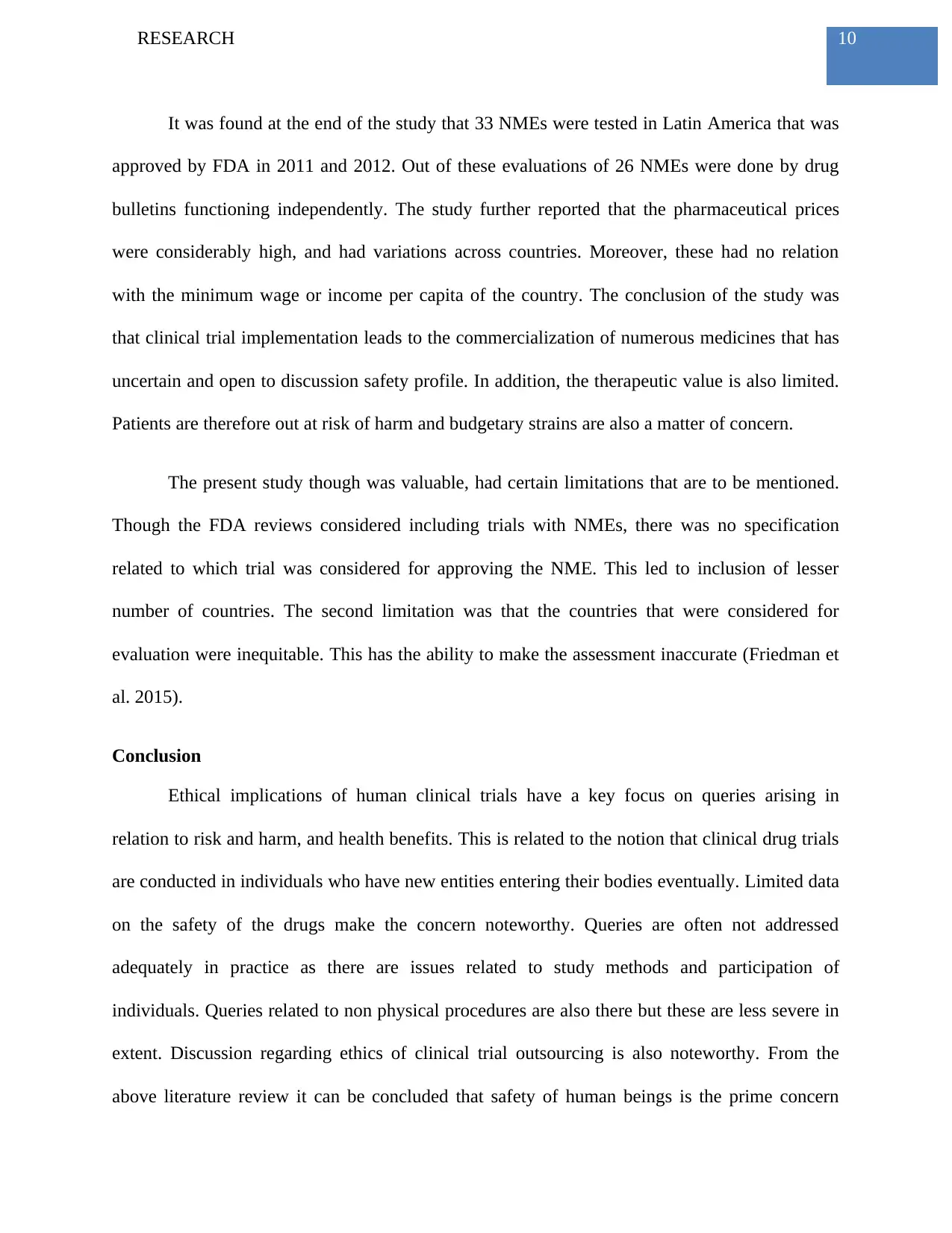
10RESEARCH
It was found at the end of the study that 33 NMEs were tested in Latin America that was
approved by FDA in 2011 and 2012. Out of these evaluations of 26 NMEs were done by drug
bulletins functioning independently. The study further reported that the pharmaceutical prices
were considerably high, and had variations across countries. Moreover, these had no relation
with the minimum wage or income per capita of the country. The conclusion of the study was
that clinical trial implementation leads to the commercialization of numerous medicines that has
uncertain and open to discussion safety profile. In addition, the therapeutic value is also limited.
Patients are therefore out at risk of harm and budgetary strains are also a matter of concern.
The present study though was valuable, had certain limitations that are to be mentioned.
Though the FDA reviews considered including trials with NMEs, there was no specification
related to which trial was considered for approving the NME. This led to inclusion of lesser
number of countries. The second limitation was that the countries that were considered for
evaluation were inequitable. This has the ability to make the assessment inaccurate (Friedman et
al. 2015).
Conclusion
Ethical implications of human clinical trials have a key focus on queries arising in
relation to risk and harm, and health benefits. This is related to the notion that clinical drug trials
are conducted in individuals who have new entities entering their bodies eventually. Limited data
on the safety of the drugs make the concern noteworthy. Queries are often not addressed
adequately in practice as there are issues related to study methods and participation of
individuals. Queries related to non physical procedures are also there but these are less severe in
extent. Discussion regarding ethics of clinical trial outsourcing is also noteworthy. From the
above literature review it can be concluded that safety of human beings is the prime concern
It was found at the end of the study that 33 NMEs were tested in Latin America that was
approved by FDA in 2011 and 2012. Out of these evaluations of 26 NMEs were done by drug
bulletins functioning independently. The study further reported that the pharmaceutical prices
were considerably high, and had variations across countries. Moreover, these had no relation
with the minimum wage or income per capita of the country. The conclusion of the study was
that clinical trial implementation leads to the commercialization of numerous medicines that has
uncertain and open to discussion safety profile. In addition, the therapeutic value is also limited.
Patients are therefore out at risk of harm and budgetary strains are also a matter of concern.
The present study though was valuable, had certain limitations that are to be mentioned.
Though the FDA reviews considered including trials with NMEs, there was no specification
related to which trial was considered for approving the NME. This led to inclusion of lesser
number of countries. The second limitation was that the countries that were considered for
evaluation were inequitable. This has the ability to make the assessment inaccurate (Friedman et
al. 2015).
Conclusion
Ethical implications of human clinical trials have a key focus on queries arising in
relation to risk and harm, and health benefits. This is related to the notion that clinical drug trials
are conducted in individuals who have new entities entering their bodies eventually. Limited data
on the safety of the drugs make the concern noteworthy. Queries are often not addressed
adequately in practice as there are issues related to study methods and participation of
individuals. Queries related to non physical procedures are also there but these are less severe in
extent. Discussion regarding ethics of clinical trial outsourcing is also noteworthy. From the
above literature review it can be concluded that safety of human beings is the prime concern
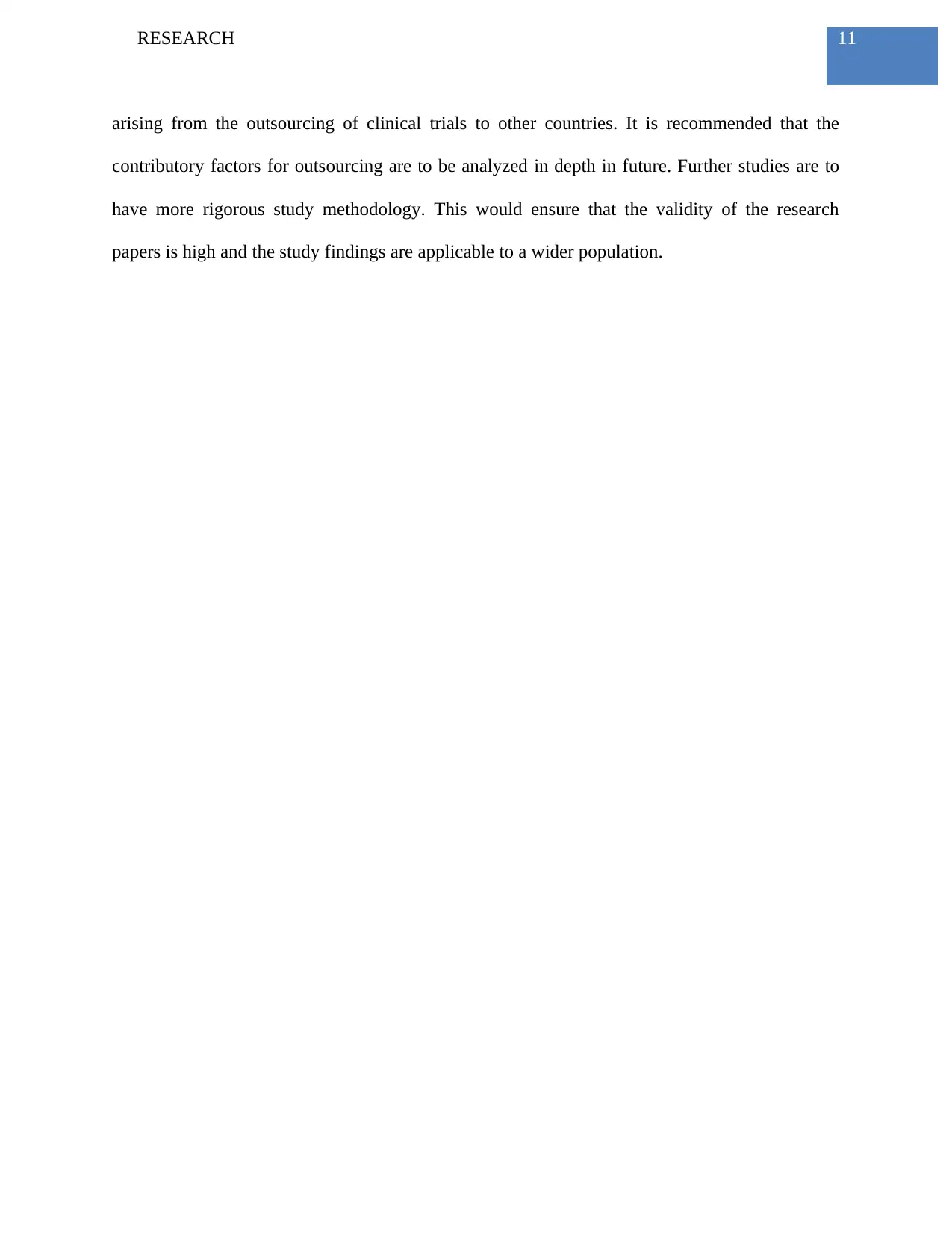
11RESEARCH
arising from the outsourcing of clinical trials to other countries. It is recommended that the
contributory factors for outsourcing are to be analyzed in depth in future. Further studies are to
have more rigorous study methodology. This would ensure that the validity of the research
papers is high and the study findings are applicable to a wider population.
arising from the outsourcing of clinical trials to other countries. It is recommended that the
contributory factors for outsourcing are to be analyzed in depth in future. Further studies are to
have more rigorous study methodology. This would ensure that the validity of the research
papers is high and the study findings are applicable to a wider population.
⊘ This is a preview!⊘
Do you want full access?
Subscribe today to unlock all pages.

Trusted by 1+ million students worldwide
1 out of 15
Related Documents
Your All-in-One AI-Powered Toolkit for Academic Success.
+13062052269
info@desklib.com
Available 24*7 on WhatsApp / Email
![[object Object]](/_next/static/media/star-bottom.7253800d.svg)
Unlock your academic potential
Copyright © 2020–2026 A2Z Services. All Rights Reserved. Developed and managed by ZUCOL.





